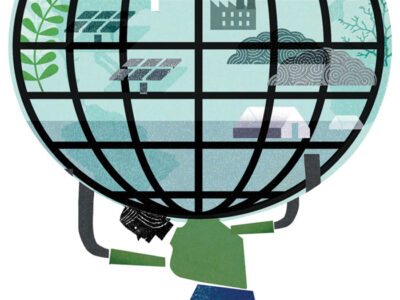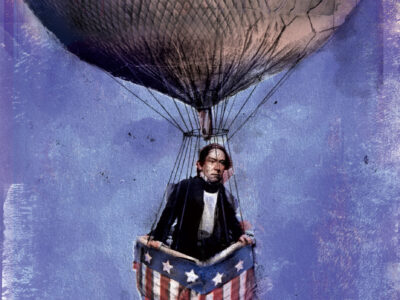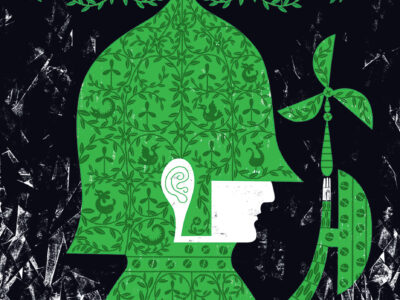
Taking on anti-climate science activists.
The idea of advocating for scientists and the environment started buzzing around the brain of Lauren Kurtz L’10 G’12 during the summer of 2004, between her sophomore and junior years at Bryn Mawr College. Visiting local farms in Pennsylvania and New Jersey, Kurtz worked on a Bryn Mawr-Princeton biology project investigating the ways that pesticides, population stresses, and other environmental factors affect native bees’ ability to pollinate.
“It got me thinking of the broader policy implications of what we were researching,” she reflects. “I realized that ultimately what I would like to be involved in is figuring out the solutions to some of the problems that the scientists were observing.”
A few years later, Kurtz enrolled in a joint master’s program at Penn in environmental studies and law, both parts of which proved rigorous but satisfying.
These days she’s the executive director of the Climate Science Legal Defense Fund (CSLDF), a nonprofit organization whose mission is to “protect the scientific endeavor in general, and climate science and climate scientists in particular, from assaults being launched through use and abuse of the legal system, many of which come in the form of invasive public-record requests.” Having worked for an international law firm and litigated mostly on securities matters, Kurtz was ready to handle the legal questions and litigation complexities faced by climate and other scientists.
“I really enjoy helping climate scientists,” she says. “I think they are doing incredibly important work. Some of them have gotten under fire for their work, and I find it really rewarding to be able to reassure them that they don’t have to worry about legal threats and that we will help them work through any legal problems.”
The activists’ tactics have included hacking scientists’ private emails as well as pursuing other unpublished information through aggressive legal means, then using it out of context to discredit or embarrass the authors. The CSLDF provides legal defense and advises the larger science community on its rights of free expression and political participation. Kurtz has also worked to expand her organization’s activities to include tracking state and federal actions and policies that concern climate science. The CSLDF works with science societies and legal groups, such as Columbia University Law School’s Sabin Center for Climate Change Law and the American Civil Liberties Union.
“Lauren is the focal point and the general marshaling all the forces,” says Columbia law professor Michael Gerrard, an authority on climate change law who collaborates with Kurtz on various projects, including one that tracks anti-science actions by the federal government. “She is the fulltime hub of the organization.”
The CSLDF was started in 2011 when three of its current board members—technology developer and executive George Zeller, meteorologist and Suffolk County Community College professor Scott Mandia, and author and entrepreneur Joshua Wolfe—wanted to provide legal support for climate scientist Michael Mann. While at the University of Virginia, Mann had been the lead author on a 1998 paper and follow-up study that documented global temperatures over the past thousand years. The studies showed that the steep temperature rise in the 20th century correlated with the steady increase in fossil fuel-based greenhouse gas emissions. The chart of the temperature pattern resembled the curved end of a hockey stick.
Mann left UVA in 2005. Four years later, hackers obtained a number of scientists’ emails to and from colleagues at the University of East Anglia in the United Kingdom, and—cherry-picking quotes and taking liberties with the context in which they had been used—published selections of Mann’s correspondence related to his statistical methods. The following year Ken Cuccinelli, then Virginia’s attorney general, sought Mann’s records and correspondence with about 40 scientists going back to 1999, arguing that he was investigating whether Mann’s state-supported research involved fraud under the Virginia Fraud Against Taxpayers Act.
At about the same time, an anti-climate science activist group called the American Tradition Institute (now Energy & Environment Legal) tried to obtain similar material under Virginia’s Freedom of Information Act. (The forerunner of E&E Legal, the American Tradition Partnership, described itself as a “no-compromise grassroots organization dedicated to fighting the radical environmentalist agenda,” while E&E Legal itself said that its mission was to achieve “free-market environmentalism through strategic litigation.”)
Eventually, Mann’s right to control his own records and emails was upheld in the Virginia courts and the integrity of his research vindicated through multiple reviews, including by the National Academy of Sciences and Penn State, where he is now a professor of atmospheric science.
Mandia and his CSLDF co-founders believed that Mann’s situation was not an isolated one.
“The spark was Michael Mann,” Mandia says. “But we knew we were going to build this to [be] something that could help others.”
When Kurtz was hired to head the CSLDF in 2014, Mann’s case was wrapping up, but his co-author on the hockey stick paper, University of Arizona climate scientist Malcolm Hughes, faced similar attacks in the Arizona state legal system. (Responding to the E&E Legal requests took at least 10 weeks and deprived him of “one of a small handful of summers remaining in [his] career,” said Hughes, a particularly odious burden given that “summer is … a time for intensive scientific activity.” His case is now under appeal. Other scientists offered similar stories.) Over the years, the CSLDF has supported Hughes in several ways, including filing amicus briefs. Three years ago, it argued that E&E Legal’s “overbroad, intrusive, and burdensome public-record requests” were not, as claimed, “part of a ‘transparency project,’” but were actually “just one part of a systematic campaign, funded by certain individuals and entities whose economic interests are threatened by any meaningful efforts to combat climate change, to create doubt about the reality, causes, and potential consequences of climate change where there should be none.”
Not all public-record requests served on researchers “constitute harassment,” noted the CSLDF in that 2015 amicus brief. Among the legitimate requests is for “information regarding the funding of published research and the potential influence of that funding on the conclusions reached.” The concern is with “personal documents and correspondence” and other “traditionally confidential prepublication materials that are crucial to the collaborative scientific endeavor, such as preliminary drafts, handwritten notes, and private critiques from other scientists.”
Kurtz says she has gained even more appreciation for some of the laws invoked by anti-climate scientists.
“A lot of the laws that get misused against scientists are great laws—for example, open-records laws are terrific laws,” she notes. “There are good reasons for these laws, but we are operating in a space where they get twisted. We don’t want to impinge on the ability of people to use these laws in positive ways.”
But, she adds, “the ongoing open-records case against the University of Arizona is emblematic of how scientists can be targeted via misuse of open-records laws. It shows how these cases can drag on for years, persistently interfering with scientists’ work, and highlights how state laws often lack the necessary clear protections for scientific research.”
Kurtz works on other challenges faced by scientists, such as advising them on their free-speech rights, but litigation is the flashpoint, and in the view of Gerrard and Mandia, it was vital to have an experienced litigator at the helm.
“For the CSLDF, having a full-time, super intelligent person who is going to be there constantly to work for people is great,” says Mandia. “You need someone to carry the torch and organize, and Lauren is great at that. She is soft spoken but really powerful and strong.”
—Rich Blaustein




